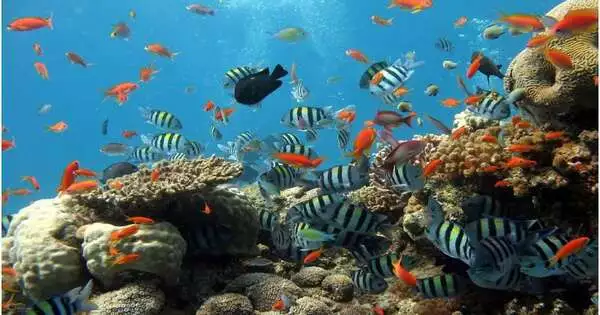Up until recently, it was believed that grazers, or fish that eat algae and other debris, kept reefs healthy as opposed to corallivores, which weaken the structure of the reef. But researchers have found that, perhaps as a result of the coral pathogens they may contain, grazer feces cause significant lesions on coral. Contrarily, the feces of corallivores may serve as a source of advantageous microbes that support coral growth.
According to Dr. Carsten Grupstra of Rice University, lead author of the study published in Frontiers in Marine Science, “Corallivorous fish are generally regarded as harmful because they bite the corals.” However, it appears that this does not encompass the entire narrative. Many of the bacterial taxa that normally associate with healthy corals are found in corallivore feces, which may lead to the naturally occurring dispersal of “coral probiotics,” similar to fecal microbiota transplantation therapy in humans.
Healthy bacteria for coral reefs?
There are many fish living in tropical coral reefs, and they constantly feces. Fish excretions spread nutrients that may aid in the maintenance of a healthy coral reef, but they also contain pathogens and sediments that can suffocate living coral, causing lesions that are characterized by dying patches of coral. We must comprehend how this cycle of nutrients and waste operates if we are to safeguard the delicate coral reef ecosystems.
“Together, these results provide a more complex picture of the functions played by fish on coral reefs and could improve our comprehension of the interactions that take place on reefs all around the world.”
Dr. Carsten Grupstra of Rice University,
Grupstra and associates investigated the impact of corallivores’ and grazers’ excretions on live coral. They added grazer fish and corallivore feces to various jars of sterile seawater while adding pieces of coral. Sterilization of some samples was done to see if the lesions could have been caused by the feces’s physical characteristics alone. Each piece of coral was examined after the experiment and classified as either dead, apparently healthy, or having lesions.
Finally, the researchers collected samples of bacteria from the feces of various corallivore and grazer species. By doing so, they were able to determine what kinds of bacteria might be causing the effects on the coral, whether or not the feces contained particular coral pathogens, and whether or not their findings from the feces addition experiment could be applied to other fish that consumed coral, algae, and other debris.
Maintaining the health of the coral.
When feces were added to the jars, coral fragments occasionally developed lesions and may have even died, while those without feces did not. All coral pieces developed lesions or died as a result of grazer feces, whereas corallivores’ feces tended to produce smaller, more localized lesions and, very rarely, even death. The minimal damage caused by sterilized corallivore feces was comparable to the minimal damage caused by sterilized feces from either type of fish.
The greater abundance of coral pathogens and higher abundance of advantageous microbes in the fresh feces of corallivores than in those of grazers raised the scientists’ suspicion that this was the cause. Thus, the fish that were once thought to be harmful might actually be helping with crucial procedures that support the health of coral reefs.
To find out how we might use fish feces in management efforts to support coral reef health, more research must be done to test how fish waste affects corals, according to Grupstra.
The researchers noted that the effects of feces on lesions might not be as severe or uniform in real-world settings. The locations and timing of fish feces are influenced by their territories and behaviors; since feces can break down in the water, lesion formation is reduced. Other fish may consume some of the excrement, and organisms that live on coral may also move any leftover excrement that settles there, potentially lessening the effects of feces.
Together, these discoveries “create a more nuanced understanding of the functions of fish on coral reefs and may help us better understand the interactions that are taking place on reefs throughout the world,” according to Grupstra. “Corallivores and grazers both play significant ecological roles, and comprehending these roles can help us manage and conserve these crucial ecosystems more effectively.”.
More information: Consumer feces impact coral health in guild-specific ways, Frontiers in Marine Science (2023). DOI: 10.3389/fmars.2023.1110346. www.frontiersin.org/articles/1 … rs.2023.1110346/full





